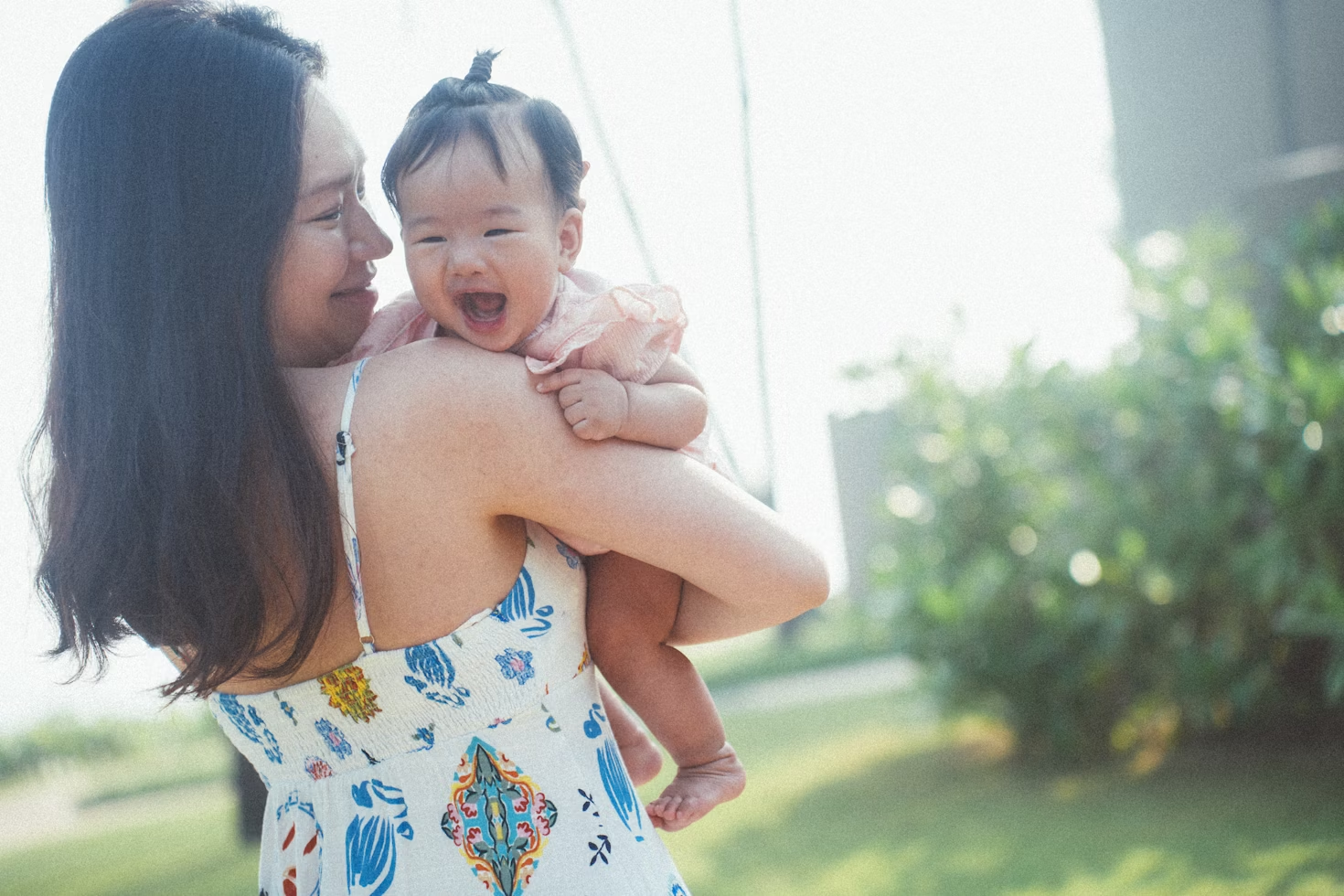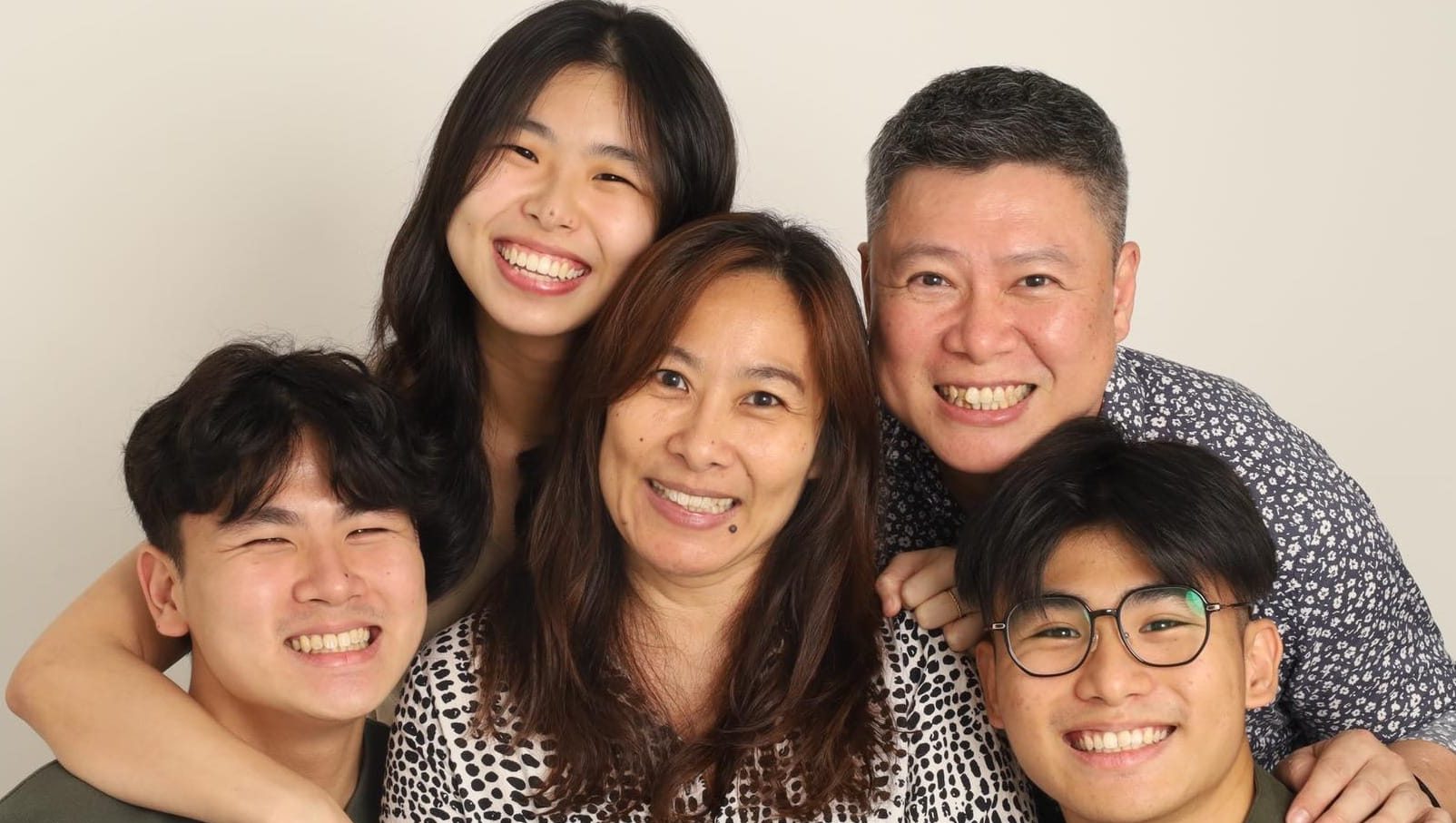Breaking away from 3 generations of abuse and drugs, a young girl finds love in a children’s home
by Janice Tai // June 24, 2022, 7:06 pm
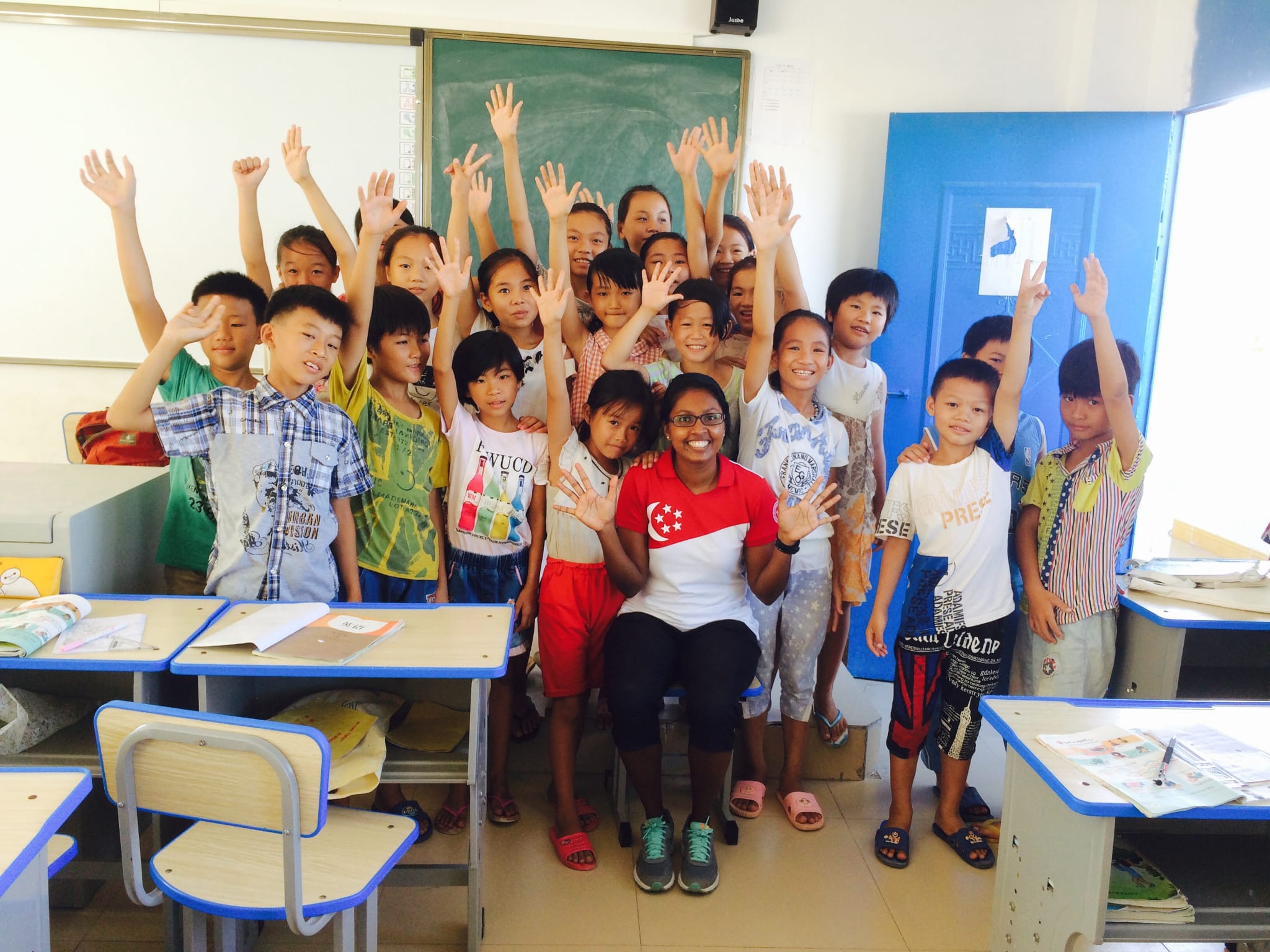
Devi teaching English to children in a village in China. It was the warm welcome and prayers she received in the Andrew and Grace Home that showed her the true meaning of love and acceptance. All photos courtesy of Devi Chandra.
Growing up in a two-room rental flat with eight or nine other relatives, home to Devi Chandra was a cramped and chaotic place.
Her relatives consumed drugs. Strangers often walked in and out of the house to join in the drug-taking and use the toilet. As the “most popular unit” in the block, the police knew about the hotspot and often swooped in for raids.
To young Devi, these were a “normal”, even “mundane”, part of her life.
The notion of family was incomprehensible to the little girl.
Her father had died when she was one. Her mother, who was neither educated nor legally married to her father, had been ostracised by her extended family and barred from living with her three children.
Whenever her mother stood at the gate of the flat to hand the relatives some money for the raising of her kids, she was not allowed to touch her children.
“All I thought about during my childhood days was how to survive. My sister and I had to wake up early to do a lot of housework, then we would stay in the room because there were a lot of men around the house,” Devi, now 35, told Salt&Light.
The line between love and abuse was blurred.
Should she not master her ABCs well, she would be made to stand facing the wall for hours or have a pencil pressed against the soft tissue between her fingers.
Should she cry, chillies would be rubbed in her eyes by relatives to ironically force her to stop doing so.
Labels such as “stupid”, “slow” and “prostitute” were brandished liberally, whenever she could not do her homework.
It was only when she and her siblings began growing up and needed to go to school that the relatives allowed their mother to live with them, just so that they would have some household help.
Her mother was treated like a servant, and was responsible for all the cooking, serving of meals and other household chores.
“I never really knew my mother as our minds were ‘poisoned’ against her from young. But I remember sometimes when we were beaten by a belt or cane, she would try to protect us,” said Devi.
“Towards her, I only felt helplessness. I didn’t know how to help her when she was treated badly, beaten or abused,” she said, tearing at the memory.
“I learnt in school that drugs was bad, but I did not know violence was bad.”
Growing up in this dysfunctional family, the line between love and abuse was blurred.
Devi had no inkling that such violence was abnormal; instead she was under the impression that the harsh actions was the way her family showed “love” to her.
“I learnt in school that drugs was bad, but I did not know violence was bad. I thought my relatives were being involved in my life,” said Devi.
Still, Devi often avoided going home by staying late in school.
“It was a dark time and I was just trying to survive without much questioning. It also didn’t matter how I felt, I just had to do the (household chores),” she said.
All she wanted was to grow up faster.
The meaning of family
Things changed in 2002 when she was 15.
One day, she was in a neighbour’s house about to head out with a fellow teenager to play badminton when a family member of hers barged into the house with a long, wooden stick.
It was unclear whether he had been taking drugs or drinking, but he started bashing her with the stick as she ran around the house in fright.
When he broke the stick in half and attempted to stab her with it, bystanders quickly pushed him out of the house and locked the gate.
Her neighbour was too stunned to help.
It was only when her family member broke the stick in half and attempted to stab her with it that bystanders quickly pushed him out of the house and locked the gate.
“I was angry and did not understand what was happening. I decided to run to the police station to seek help,” said Devi.
She secured a personal protection order against her family member and was interviewed by a social worker.
When her relatives found out, they were livid that she had reported her own family member.
Burdened with guilt, Devi was sent to the hospital for treatment and protection.
During the two weeks she was warded, no one visited her or took her home.
As she rested in the hospital bed, a man and woman walked towards her and said: “Let’s go home.”
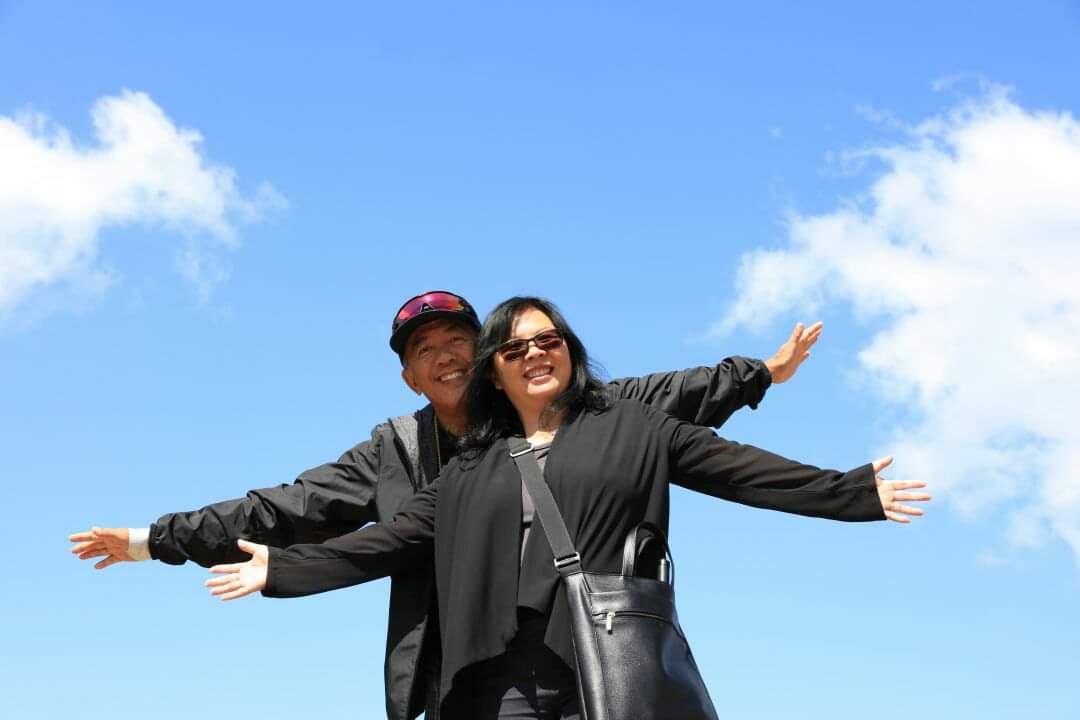
Andrew and Grace, the founders of AG Home, welcomed Devi into their home during her tumultuous childhood years.
Shocked and confused, Devi asked: “Who are you? Where are we going?”
The couple introduced themselves as Andrew and Grace, and told her that the Government had requested that they take her in.
She felt lost. After packing her things, she followed the couple to their green car.
Upon receiving the bread, Devi started crying. “I just felt a deep sense of love from her and in her action.”
They arrived at a big hostel – Andrew and Grace (AG) Home – where there were many other girls just like her. She was taken to a dormitory where she shared a room with three other girls.
The next morning, she woke up feeling hungry. Walking down the corridor, she met Grace who took her to the kitchen and gave her a slice of bread and a cup of Milo.
Upon receiving the bread, Devi started crying.
“I just felt a deep sense of love from her and in her action. In the past, no one would present breakfast to me as we usually helped ourselves to whatever was on the table,” said Devi.
She was introduced to the daily routine at the AG Home: Morning devotions, area clean up, skills development and character-building programmes, as well as sports activities.
Initially, Devi felt lost. After a lifetime of guardedness, she did not know who to allow into her life.
“Ah Pa” and “Mummy Grace”
Everyone in the AG Home called its founders “Ah Pa” and “Mummy Grace”. Devi found she could not.
It was only after two weeks that some of the walls in her heart came down.
Devi was coming down the stairs as everyone was preparing to attend a staff member’s wedding, when Pastor Andrew walked up to her like a father and said: “Devi, would you like to dress up more?”
“I am good like that, Ah Pa,” she replied. The affectionate term of address suddenly rolled off her tongue.
“There was a consistency in their love that I saw every day. I knew they would not fail me or leave me.”
Every morning, the 60 girls would encircle Pastor Andrew and Grace as the couple discussed devotions from Our Daily Bread. The couple would also pray for the girls.
Life felt so different to Devi.
“It was eye-opening. I remember thinking, ‘So this is what a family is. A family does things together. Ah Pa and Mummy Grace would play with us and even when we do area cleaning, they would be involved’,” said Devi.
Immersing herself in this exciting world packed with activities, Devi did not think of her family much.
Ah Pa, Mummy Grace and the staff loved the girls there like their own. If she needed a toothbrush, she would get one. If she was afraid to sleep, she could always go and talk to a staff member who would pray with her.
Here, Devi felt seen. When she did well in her ‘N’ levels, she was publicly affirmed. Pastor Andrew also noticed that she was good in running and picked her to be a member of the Home’s running team.
As no one from her family came to visit her, the staff team also made it a point to throw a birthday party for her every year.
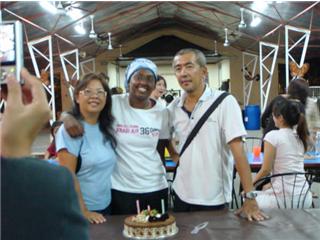
Devi celebrating her 21st birthday with Ah Pa and Mummy Grace and the team at AG Home.
“There was a consistency in their love that I saw every day. I knew they would not fail me or leave me. Every day during the devotion time, I also heard them talk about God and about experiencing His love,” said Devi.
“Who is this God?” she wondered.
It was a month after she first came to the Home when she had a personal encounter with God.
Peace and purpose
Devi was sitting in the garden when she chanced upon a Bible that was lying around. As she began reading the book of Proverbs, the words seemed to jump straight out of the Bible towards her.
Having grown up with labels such as “good for nothing” and “ugly” constantly hurled at her, the Bible verses had a great impact on her.
Specific words caught her eye and she exclaimed in her heart: “These words are so true!”
One of the verses was Proverbs 18: 21: “The tongue has the power of life and death, and those who love it will eat its fruit.”
Having grown up with labels such as “good for nothing” and “ugly” constantly hurled at her, the verses had a great impact on her.
Just then, a staff member walked past and Devi stopped her.
“What do I need to do to accept Jesus into my heart?” Devi asked. By now, she had encountered enough love in the Home and truth from the Bible that made her hunger for God.
That day, as Devi said the Sinner’s Prayer, she felt peace and knew that there was a purpose for her life.
As she started walking with the Lord, her identity of being loved by Him was shaped and strengthened.
As Devi said the Sinner’s Prayer, she felt peace and knew that there was a purpose for her life.
She began experiencing miracles in her life.
Once she did not manage her allowance from the Home well and ran out of money. Getting on her knees, she prayed. Shortly afterwards, she heard an announcement for her to go downstairs. It turned out that she was called down to collect a $100 cheque that had just come in from a race she had won – an event she had forgotten about.
Another time, she prayed for running shoes in order to participate in a race. A volunteer, despite not being aware of her prayer, brought her a pair of running shoes.
“God was very real to me. I felt Him being there with me, loving me and taking care of my needs,” she said.
As she experienced His faithfulness, Devi started thinking about her family members and yearning for them to know Him too.
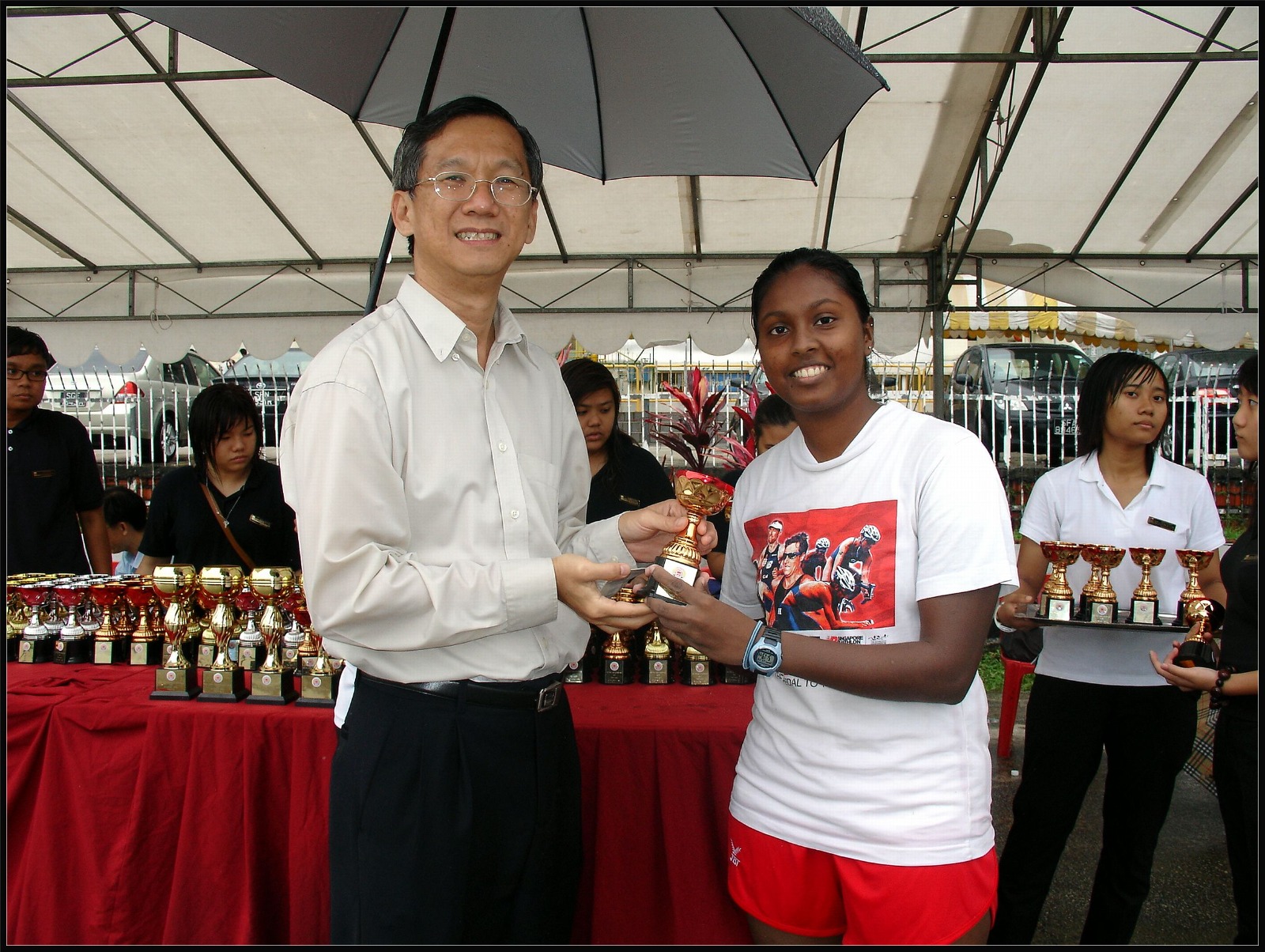
Devi, who represented ITE in a cross country race, receiving a trophy for her win.
In the lobby of the Home, she sat down and started talking to God about what was in her heart. A Bible was next to her and she randomly flipped it open. The verse the Bible opened to was Acts 16:31: “They replied, ‘Believe in the Lord Jesus, and you will be saved—you and your household.’”
Seeing this as a promise from God, she held on to the verse.
Breaking chains
One day, during a counselling session, a social worker from a Family Service Centre drew a genogram.
In the genogram, Devi saw three generations of violence, drugs and abuse in her family history.
“I get very negative thoughts like ‘Maybe it’s better if I take drugs’ and I would have to pray and ask God to help me.”
The social worker then asked her what her stand would be.
Would she like to continue with the generation of violence, drugs and abuse, or would she like to break this cycle?
Devi’s eyes were opened to the generational patterns before her and she realised she had the choice to make a change.
“I decided to break this cycle not just for me but for the generations ahead of me with Christ as my foundation. Instead of violence and abuse, I want to cultivate gentleness, love and the other fruits of the spirit,” said Devi.
The road ahead, and the work needed to be done from the inside out – was not easy. But Devi chose not to run away from it. Instead, she asked God for His courage and boldness to deal with her past and present.
Temptations to behave according to what she has been exposed to for most of her life came aplenty.
“I decided to break this cycle not just for me but for the generations ahead of me with Christ as my foundation.”
She found that the suppressed anger within her was beginning to show during the times when she would scream or speak in a loud, sarcastic voice towards other girls. Whenever she was angry, she also had strong feelings of wanting to raise her hand to hit the other party.
“But my conscience would step in and I would ask myself why I am thinking or acting this way. Then I would walk away,” said Devi.
“It is difficult. When things in life don’t go my way, I get very negative thoughts like ‘Maybe it’s better if I take drugs’ and I would have to pray and ask God to help me.”
What helped her immensely was sports.
It became an outlet for her pent-up emotions and taught her many character-building and life skills.
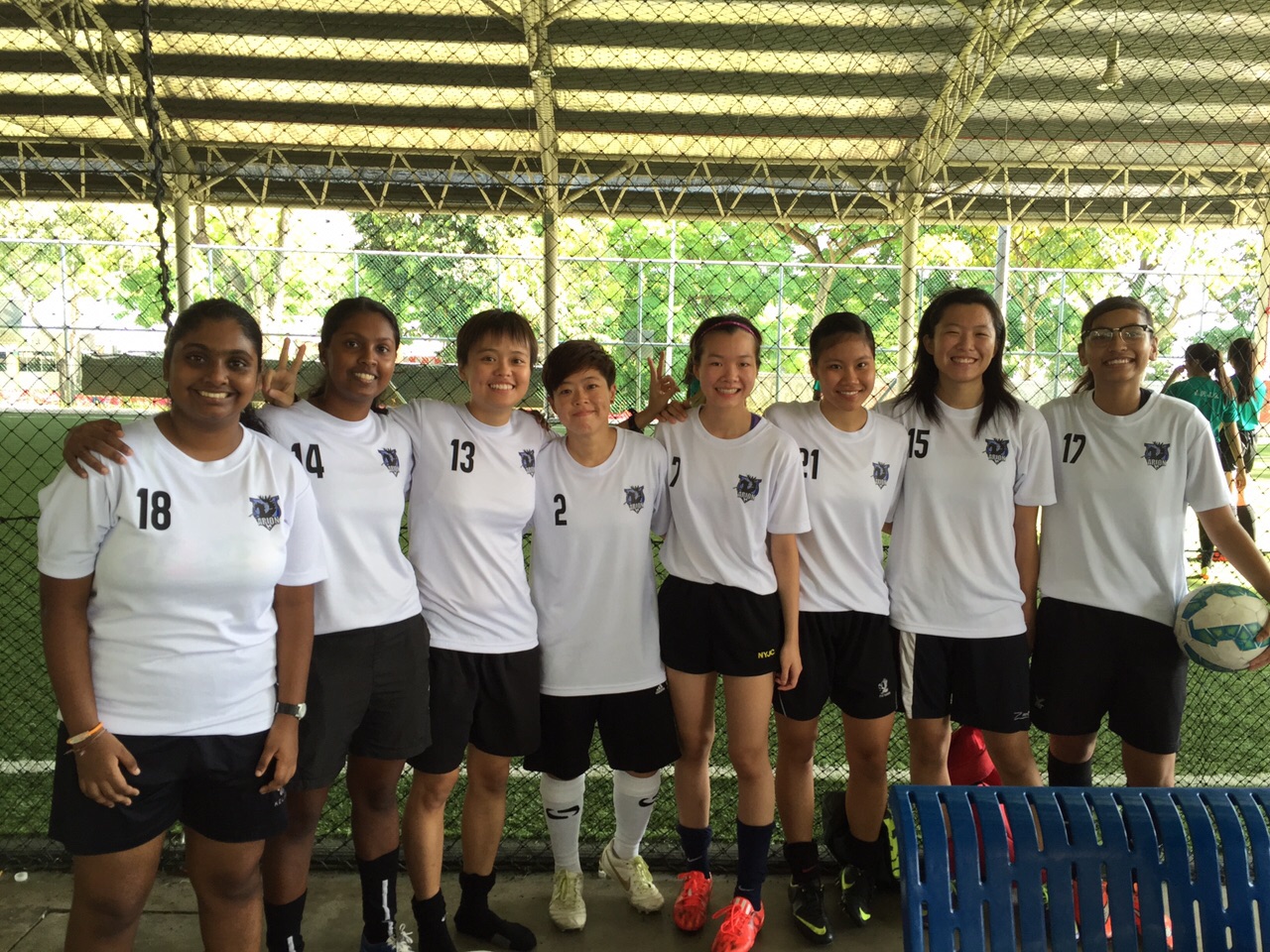
Devi (second from left) enjoying a game of soccer with friends outside the AG Home.
When she does distance running or plays basketball, for instance, she learns about teamwork, pacing, breathing and the importance of being forward-looking. When she sails, she picks up the skills of remaining in control despite unpredictable conditions on the seas.
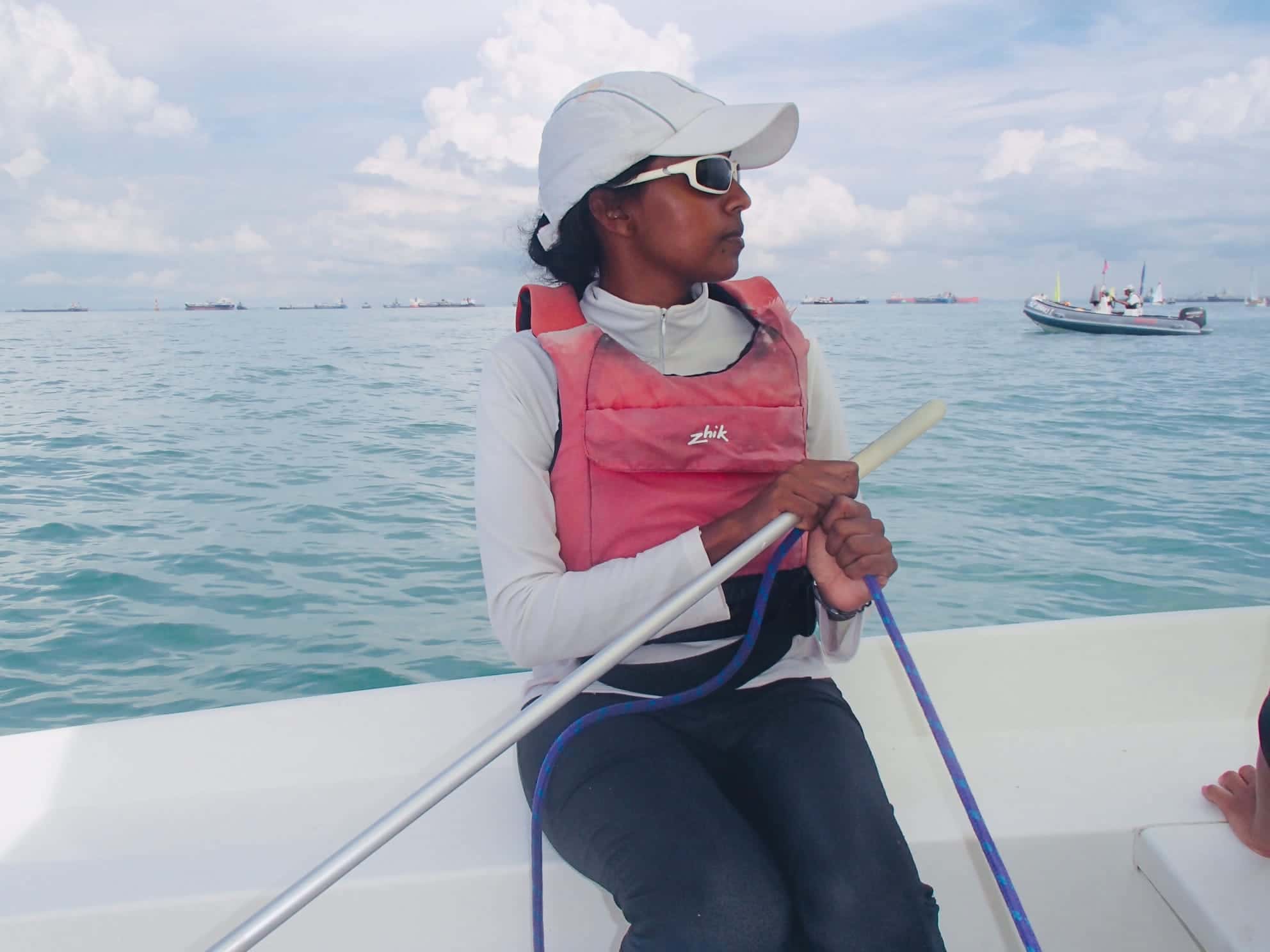
Sailing in the open sea taught Devi much about navigating life.
Having mentors from the Home who became her spiritual parents, and having a church to journey with her, also helped her throw off fears of feeling abandoned and neglected.
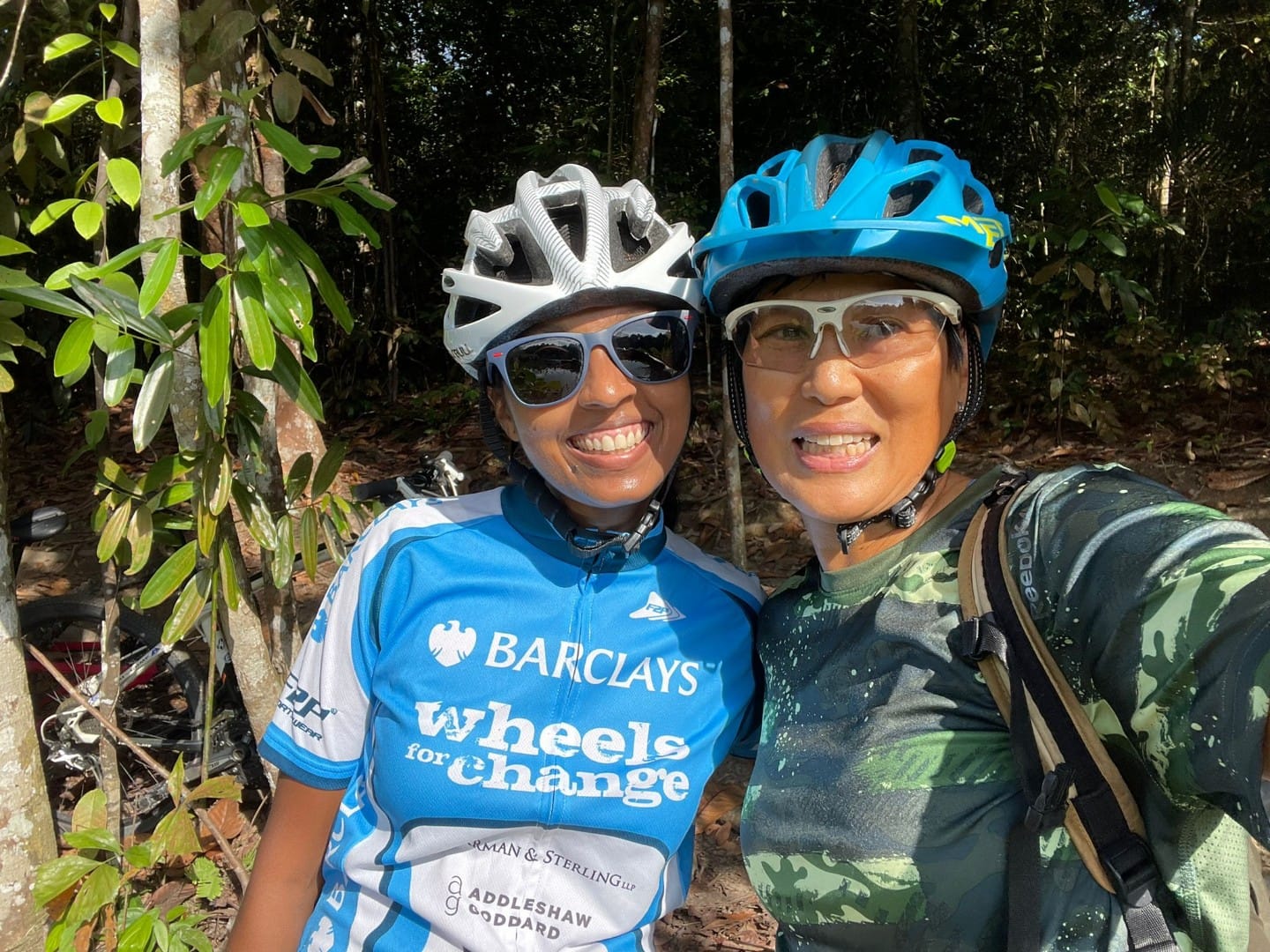
Devi with her sports mentor, Naomi Tan.
“They noticed me, welcomed me and whenever I talked about my family, they would be there to hold me and cry with me,” said Devi.
God would wake her up at 4am while the rest were still sleeping so that she could spend time with Him.
After completing her studies at the Institute of Technical Education (ITE) at the age of 21, Devi felt led by God to work for AG Home as a youth and sports worker to support other cohorts of girls.
She worked at the Home for seven years before leaving to work as a child protection coordinator in the social service sector.
When she left the job at the children’s home, she knew it was time for her to return home to her family.
The move would prove to be difficult, as moving back to the same two-room rental flat to live with her relatives reminded her of the past and brought back all the negative emotions.
After 15 years of praying for her mother, Devi’s mum finally received the Lord as her personal saviour.
“There was no more violence and abuse, but I felt alienated and could not connect with them. So, I kept to myself but prayed every day for God to help me with forgiveness and reconciliation,” said Devi.
In God’s mercy, He knew that Devi would need her own personal space in the cramped two-room rental flat to pray and do her quiet time.
So, on many occasions, God would wake her up at 4am while the rest were still sleeping so that she could spend time with Him, even if it was on a dirty kitchen floor.
After years of encountering the love of God in her own prayer closet, as well as through counselling, inner healing and deliverance, Devi found the grace and strength for forgiveness and restoration.
God’s promise fulfilled
Slowly, she began to apply what she had learnt in the children’s home in her own family setting.
She would cook dinner and – just as how everyone sat and ate together in the Home – she encouraged her family to eat together.
“With His unfailing love, He has given me the capacity to love others. Finally, I know what love is.”
Similar to how there was no favouritism in the Home, she would buy the same thing for every one whenever she bought treats for the family.
Her family members and relatives observed her talking and behaving differently, and slowly, reconciliation came to pass.
After 15 years of praying for her mother, Devi’s mum finally received the Lord as her personal saviour. One year later, after 16 years of prayers, her brother also came to Christ while in prison. Two years later – after 17 years of prayer – her sister also came to know the Lord.
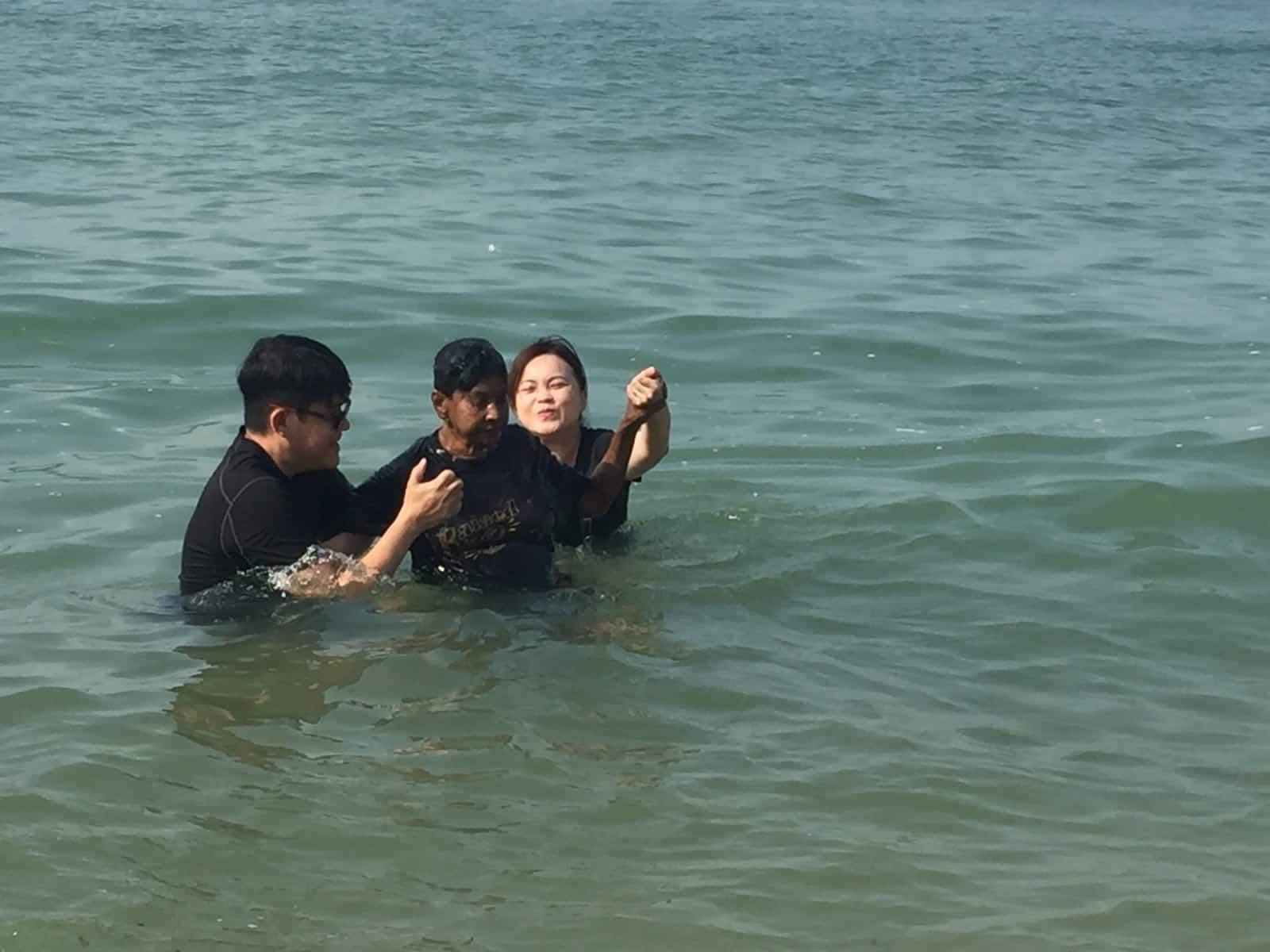
Devi’s mum was eventually baptised. She died last year from liver disease.
“I just wept. It was beautiful seeing the whole family come to know God. He has fulfilled the promise He gave me earlier,” said Devi.
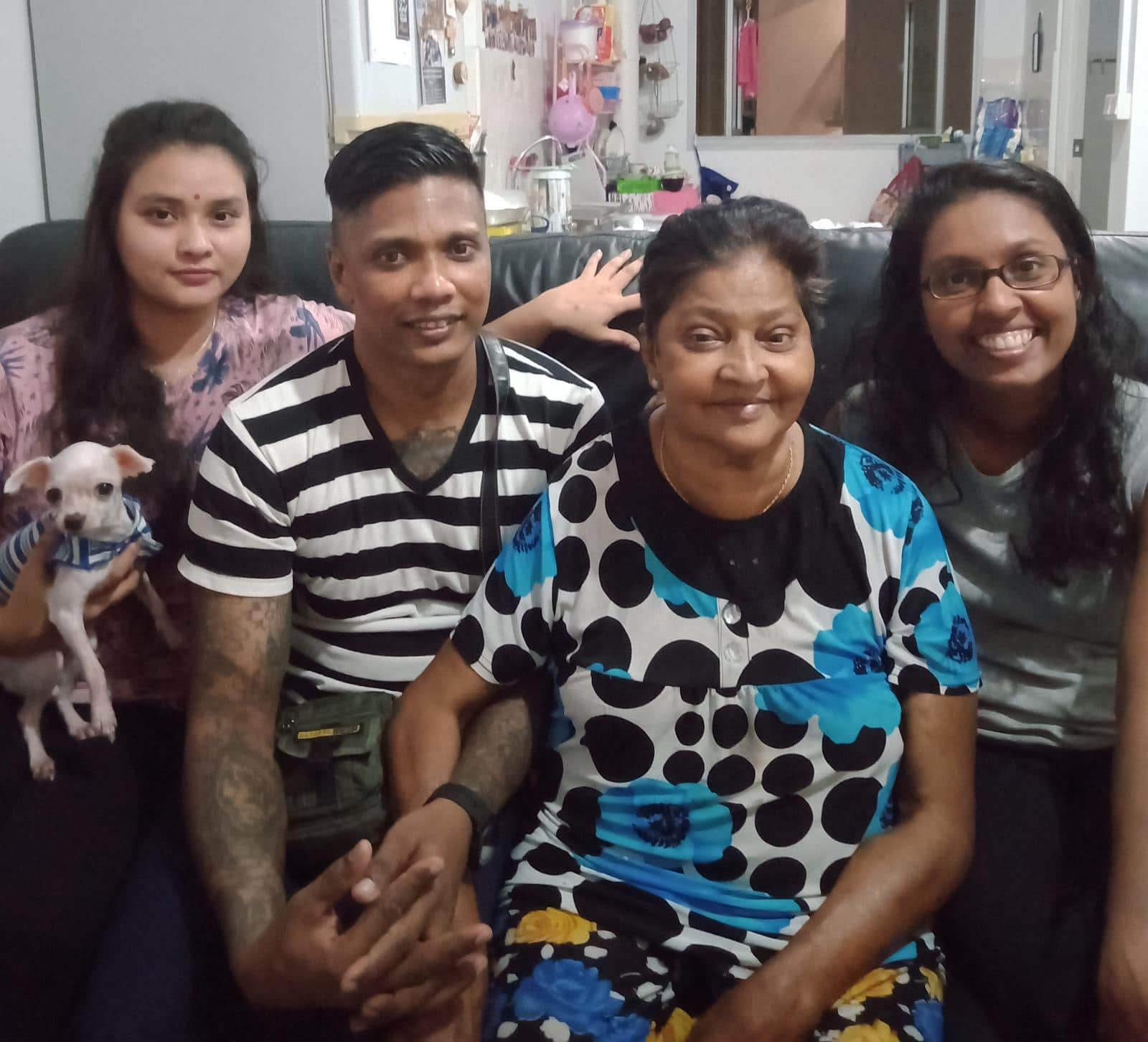
Devi’s whole family (younger sister, older brother and mother) came to faith after more than a decade of Devi’s prayers.
With restoration in her life, 35-year-old Devi has since been able to impact more lives in the Kingdom and community at large.
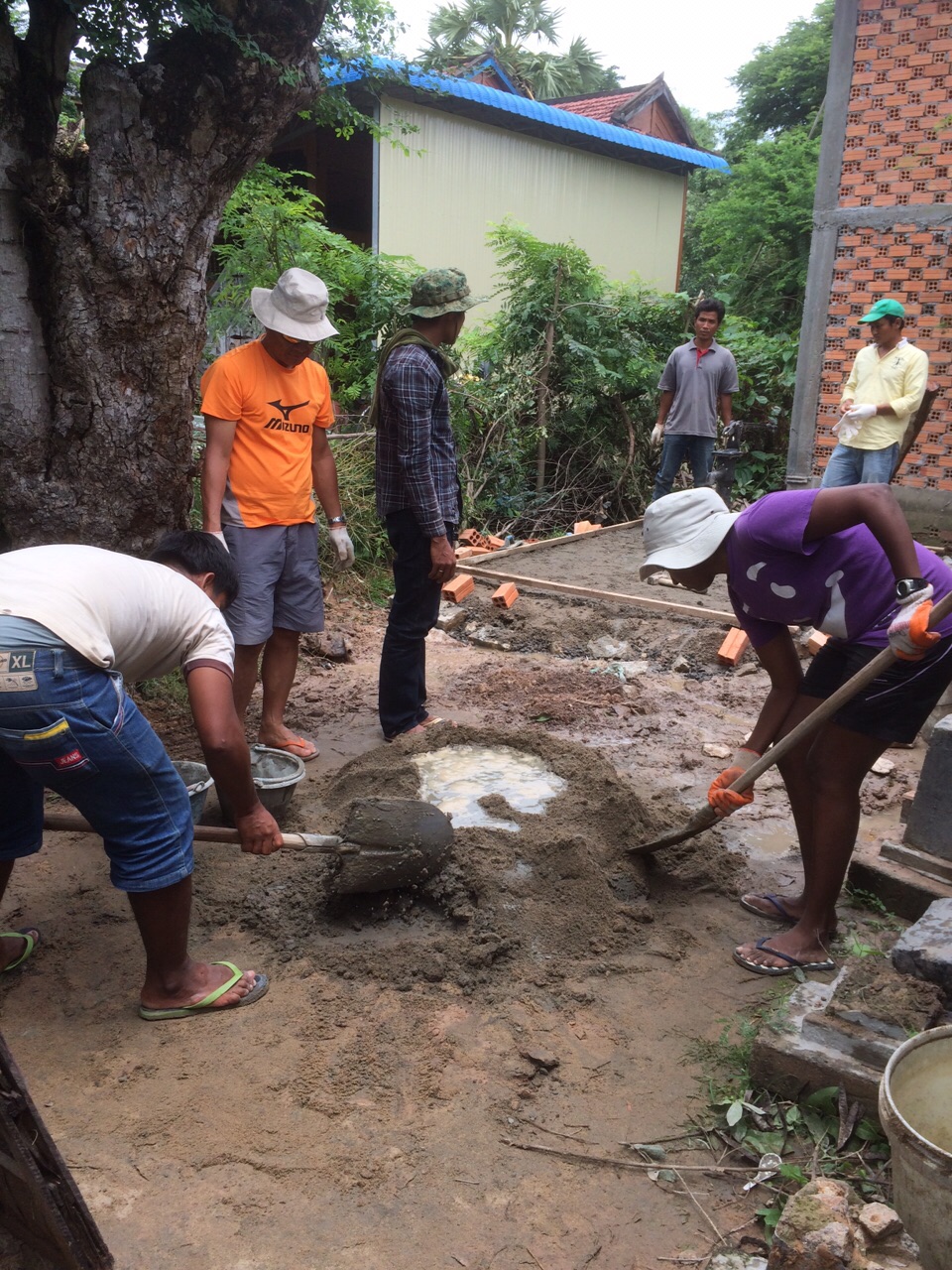
One of the mission trips that Devi has taken was to Cambodia, where the team built a well, among other projects.
She has since started a women’s fellowship in China and helped to plant a church there, despite only being able to learn Mandarin during her brief time there.
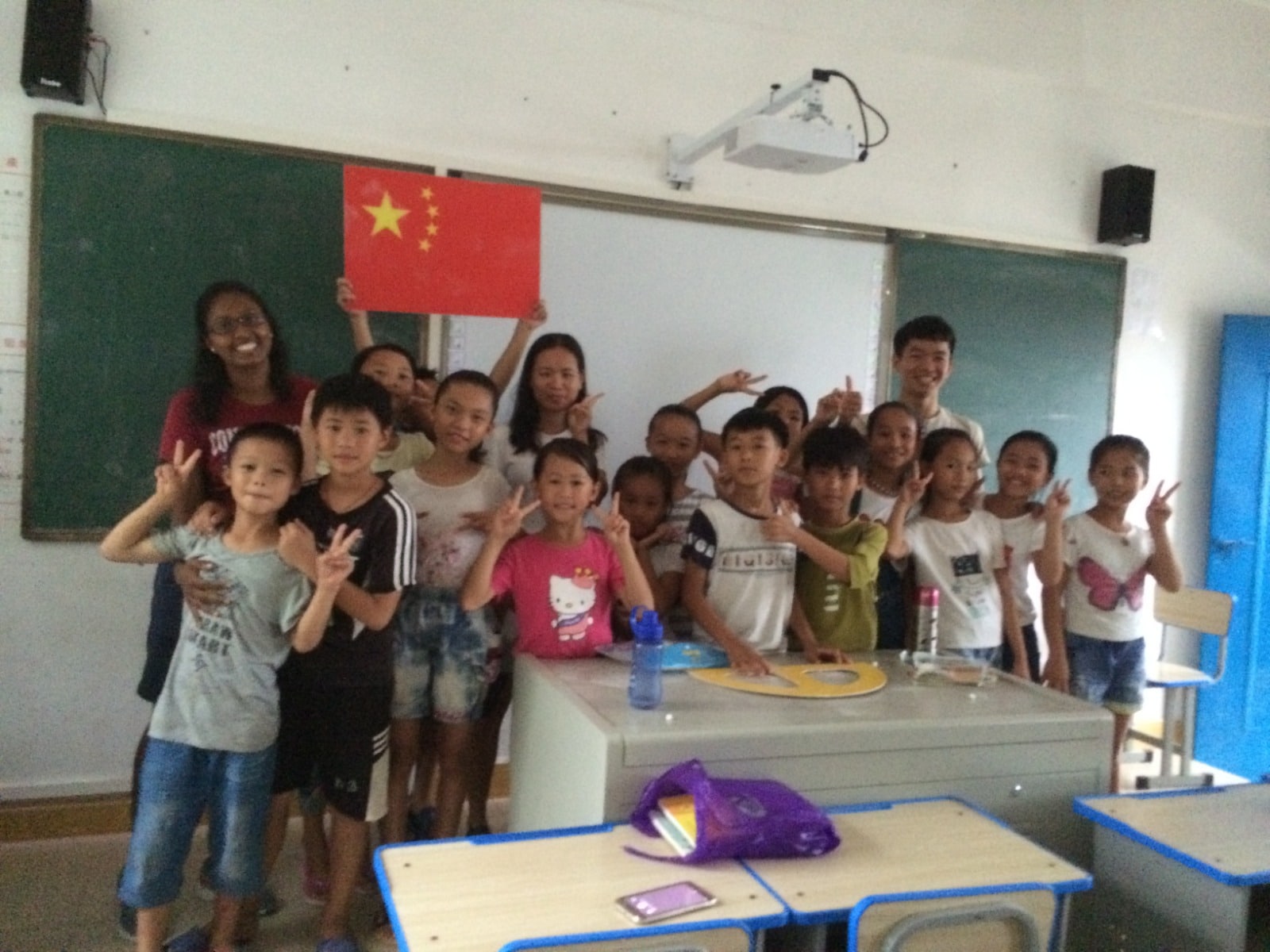
Devi teaching English to village children during a summer camp in China.
Two months after Russia invaded Ukraine in February, Devi and a team from Tung Ling Bible School went to Germany for two months to minister to the Ukrainian refugees.
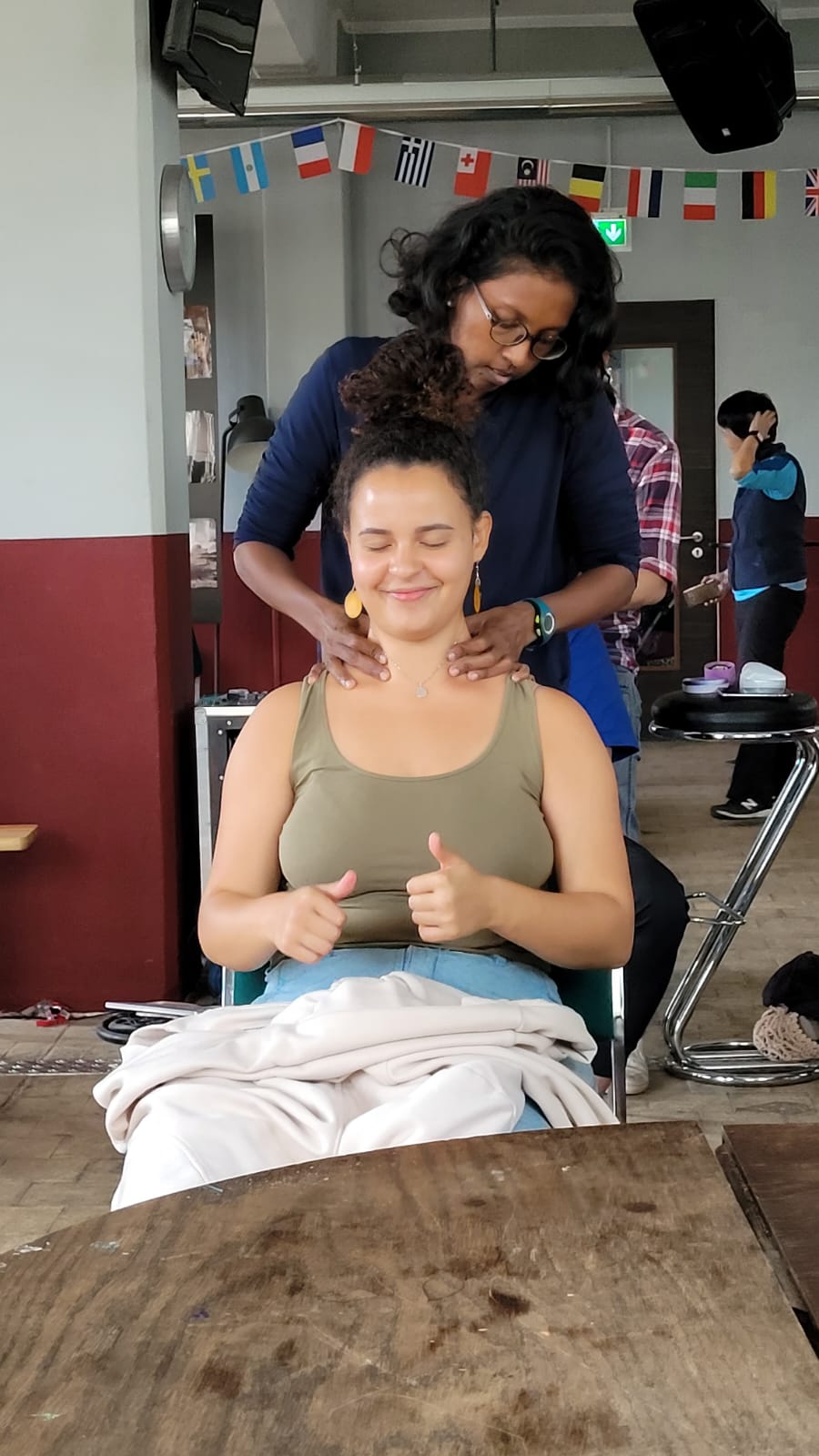
The Mother’s Day special programme for the refugees and missionaries in Germany included providing them with massages.
Devi is also a long-time volunteer with the Para Cycling Federation of Singapore, as she is passionate about using sports to empower persons with disabilities.

Devi helps train persons with cerebral palsy or other disabilities in recreational cycling.
Said Devi: “God has been compassionate and gracious to me. With His unfailing love, He has given me the capacity to love others.
“Finally, I know what love is. God is love and His love conquers everything.”
RELATED STORIES:
How a victim of childhood abuse found the healing to minister to others in Thailand
We are an independent, non-profit organisation that relies on the generosity of our readers, such as yourself, to continue serving the kingdom. Every dollar donated goes directly back into our editorial coverage.
Would you consider partnering with us in our kingdom work by supporting us financially, either as a one-off donation, or a recurring pledge?
Support Salt&Light